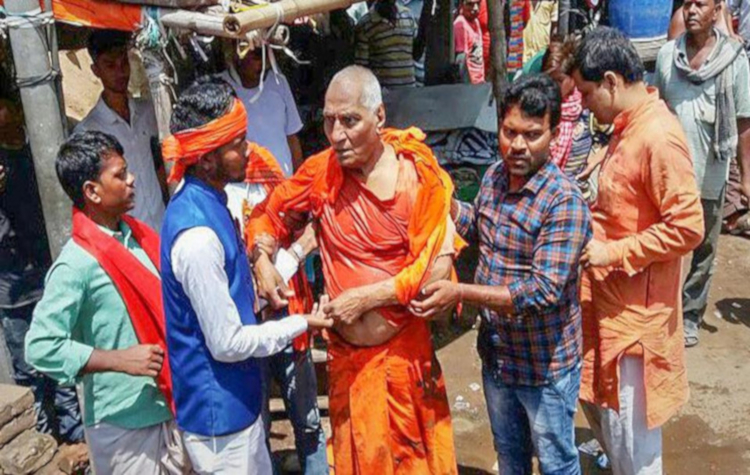(Kathmandu/Bangkok, 19 July 2018) – The Asian Forum for Human Rights and Development (FORUM-ASIA) is gravely concerned about the brutal attack on social activist, Swami Agnivesh by a mob on 17 July 2018 outside a hotel in Pakur, Jharkhand State, India. The 78-year-old Swami Agnivesh is a globally renowned civil society activist and human rights defender. He is particularly known for his lifelong efforts to stop bonded and child labour in both India and globally, and being at the forefront of movements for peace, justice, religious harmony, dialogue, and democratic governance.
Swami Agnivesh was going out of his hotel to attend a programme, when a group of people carrying black flags approached him and attacked him. He was punched, kicked and pushed to the ground, and his clothes were torn. He was admitted to hospital.
Allegedly the attackers were members of Hindu religious fanatic groups associated with the ruling party, Bharatiya Janata Party.
Swami Agnivesh later spoke to media. He alleged that there was no security personnel present at the venue, and that the local Superintendent of Police and the District Magistrate did not respond to his requests for their presence. He demanded police to identify the attackers from footage taken during the attack, and for action to be taken against them. He asked for a credible judicial inquiry to be conducted by a sitting judge of the Jharkhand High Court. No arrests have been made so far, despite the availability of video evidences. A Special Investigation Team (SIT) has been formed by the police, and based on a first information report (FIR) against 100 people, police reportedly identified eight of the attackers.
This attack is another incident in a broader trend. FORUM-ASIA is deeply concerned over the rise of hate crimes, communal violence and shrinking civic space for free expression in India, which is endangering the right to life and liberty of people, in particular human rights defenders. The increase in violent hate crimes by religious vigilante groups, reportedly affiliated to the ruling party, together with the rise in communal violence have created an atmosphere of intolerance and insecurity in the country.
The Home Ministry informed the Lok Sabha (Lower House of the Parliament) on 6-7 February 2018 that in a period of four years, ending in 2017, as many as 2,920 communal violence incidents were reported in India, which caused the deaths of 389 and injured 8,890 people.[1]
According to a recent Amnesty International India report,[2] a total of 67 hate crimes against Dalits, and 22 against Muslims were recorded in the first six months of 2018. In response to a public interest litigation case, the Supreme Court of India, in its order on 17 July 2018, recommended the Government to enact a new law, which should classify ‘lynching’ as an offence with adequate punishment for effective deterrence and to provide immediate compensation and support to victims and their families.[3]
FORUM-ASIA calls on the Government of India to undertake urgent actions against the attackers, and to ensure the safety and security of Swami Agnivesh. FORUM-ASIA further reiterates that the Government must ensure a safe and enabling environment for human rights defenders to carry out their legitimate work without fear of intimidation or threat to life.
FORUM-ASIA calls on the National Human Rights Commission to exercise its power under the Protection of Human Rights Act (1993) to independently intervene in this case. It should also address the issue of increasing attacks on human rights defenders advocating for constitutionally guaranteed rights.
***
For a PDF version of this statement, please click here.
For further information, please contact:
– South Asia Programme, FORUM-ASIA, [email protected]
[1] http://realreport.in/100-hate-crimes-in-first-six-months-of-2018-highest-in-up-amnesty-report.
[2] https://amnesty.org.in/news-update/100-hate-crimes-allegedly-committed-in-the-first-six-months-of-2018-reveals-halt-the-hate/.
[3] http://www.livelaw.in/lynching-parliament-may-create-a-special-law-read-supreme-court-guidelines/.




